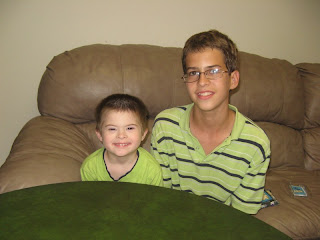"Take it easy today," the doctor said after surgery yesterday. At least that's what Nevin tells me he said since I was sort of, um, out of it. "Then you can resume regular activity according to how you feel. Your leg will let you know if you're doing too much."
Well, I'm sort of having trouble communicating with my leg. I'd rather the doctor just said, "Get up and walk 10 minutes out of every hour." That would be easy.
But this thing about listening to my leg. I mean, as soon as I think, yes, it's telling me to lie back and take it easy, then it speaks up and says, "You lazy bum. What do you mean sitting here and letting poor Nevin do all the work? Get up right now!"
And re-wrapping it is another story. There is a fine line between wrapping firmly and shutting off the blood to your toes.
It all makes me have to actually think when I'd rather just take a mental leave of absence for a while.
It's been said that nothing grieves a child more than to study the wrong lesson and learn something he didn't have to learn. (
Oh, no! Extra knowledge! What will I do with it?)
But by the time we're adults, we know that extra learning only expands the realm in which we live, creating a more vibrant place to grow.
Of course, we all want our children to learn and to enjoy learning. But how do we accomplish this?
Meet the
Hobart Shakespeareans. Fifth graders from the inner city. For most of them English is a second language.
Meet
Rafe Esquith. The teacher who year after year does the impossible, transforming young minds to perform far above the expected, training them to learn for the intrinsic value of knowledge, and ultimately changing them to benefit society with their creativity.
What curriculum does he use, that can bring about such marvelous results?
The answer is this: none.
His classroom has two rules. Be nice. Work hard.
And I'm guessing that's not what you wanted to hear.
But these children, whom nobody expected to succeed at anything except maybe crime, are reading above grade level, doing algebra, and performing Shakespeare's plays. And all because of a teacher who goes the extra mile, who observes the children and sees how they really learn, who invests overtime in the future--theirs, yours, and mine.
I am not suggesting that you move to California and enroll your children in Rafe's class. I am not even suggesting that you find a similarly talented professional to inspire your child.
We all seem to want a miracle. A short way of getting there from here. There must, we think, be some magical program that will get us what we want. If we just do this 10 or 20 minutes a day, find the right teacher/therapist, gulp the right nutritional system, buy the right computer program, etc. then, at last, everything will fall into place.
But the truth is that the magic we are looking for exists between our own ears.
We live in a time when becoming empowered with knowledge is extraordinarily easy. The Information Superhighway brings it straight to our doors. News You Can Use falls from the sky in any form you want. But all the knowledge in the world won't be beneficial unless we put it to work. And we, as parents, must take that responsibility to do so.
You are the Rafe in your child's life.
Read. Make informed decisions.
Observe. How does your child learn? What time of day does he function best?
Keep records. The progress may be slow, so keeping a calendar of your child's progress helps you to see that, yes, he
is performing on a higher level this month than last. At the end of May, he might not have been answering comprehension questions with any degree of sensibility. "Is there a dinosaur in the room?" "Yes!" But by August, you realize that he is listening to your questions and trying to make reasonable replies. "What did you see on your field trip to the farm?" "A pig! And horse! And dinosaur!" (Well, okay, 2 out of 3 isn't bad.)
Pay attention to the details. Respond with enthusiasm when he uses his new vocabulary words. Notice when he opens the middle drawer, then says to himself, "No, bottom drawer!" Celebrate and reinforce. "You found your bath toys in the bottom drawer!"
Practice new skills and build on previous knowledge. It is of little use to have the most brilliant professionals working with your child if you are not going to have the self-discipline to reinforce at home what they are teaching.
These things sound so simple. And that's probably where we tend to fall down. There is no glamour in doing the same type of thing day after day. But it's in the repetition and the knowledge of when to move forward that the foundations of learning are laid.
We just have to listen and think and act. In short, connect with your inner Rafe.
Now let me go speak to my leg.
Did you say purple? Aaaarrrrgghhh!

























































